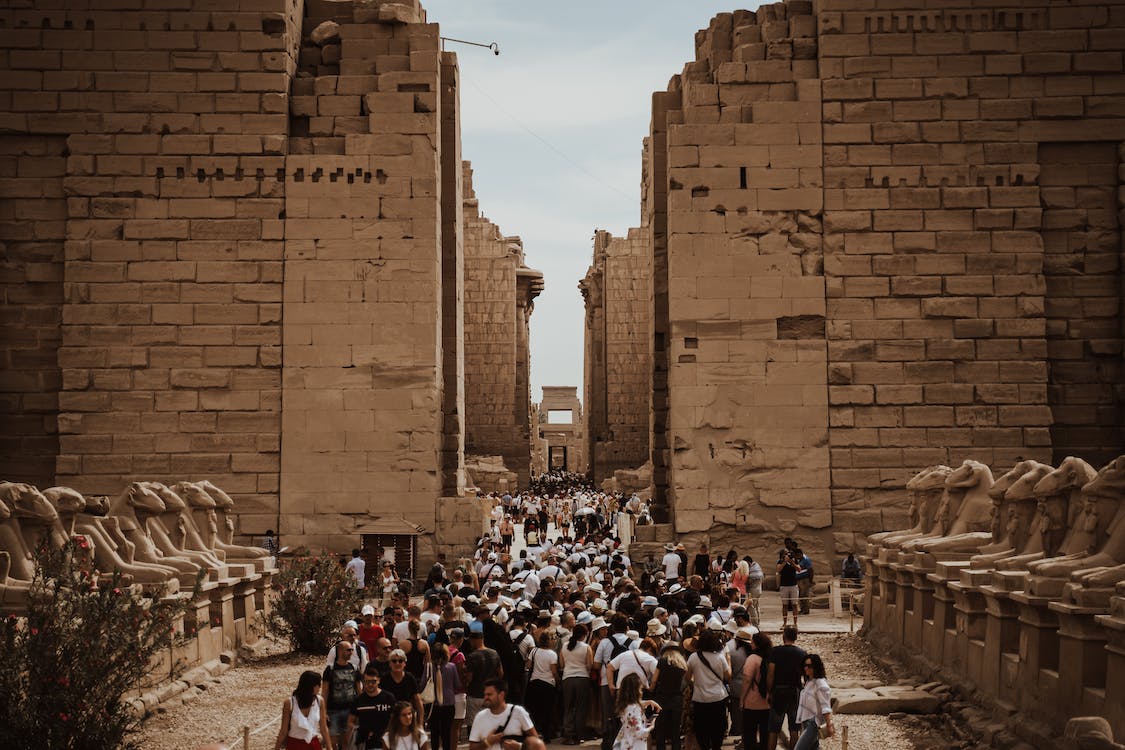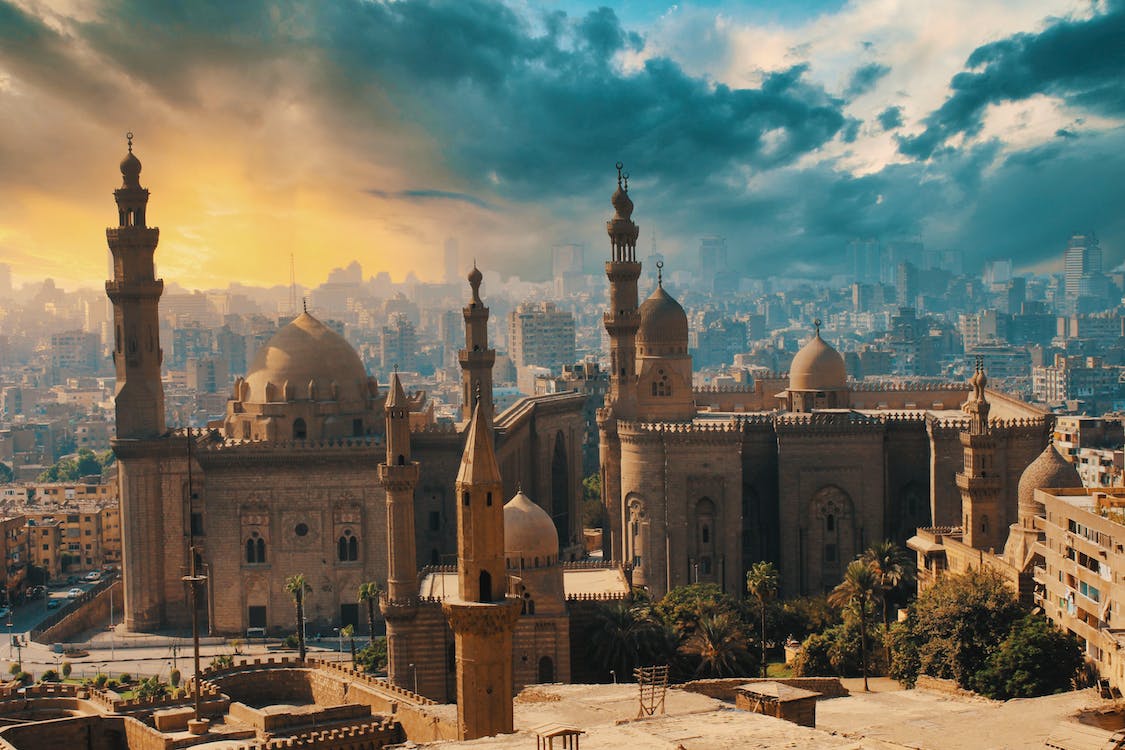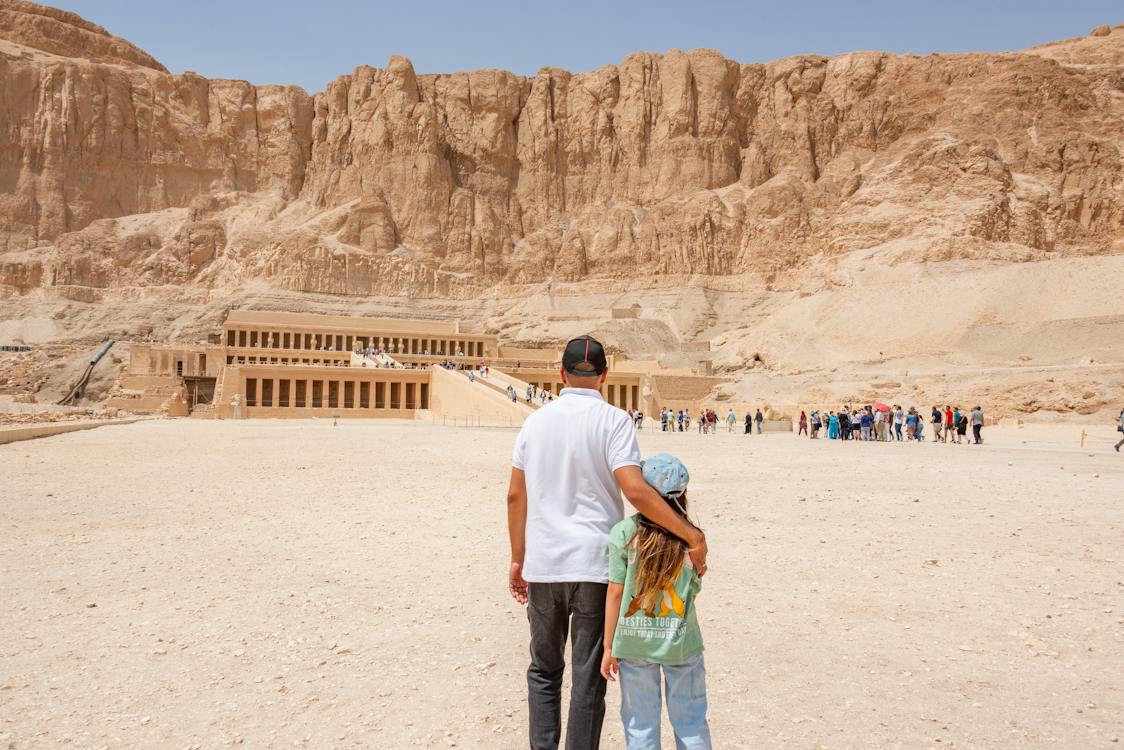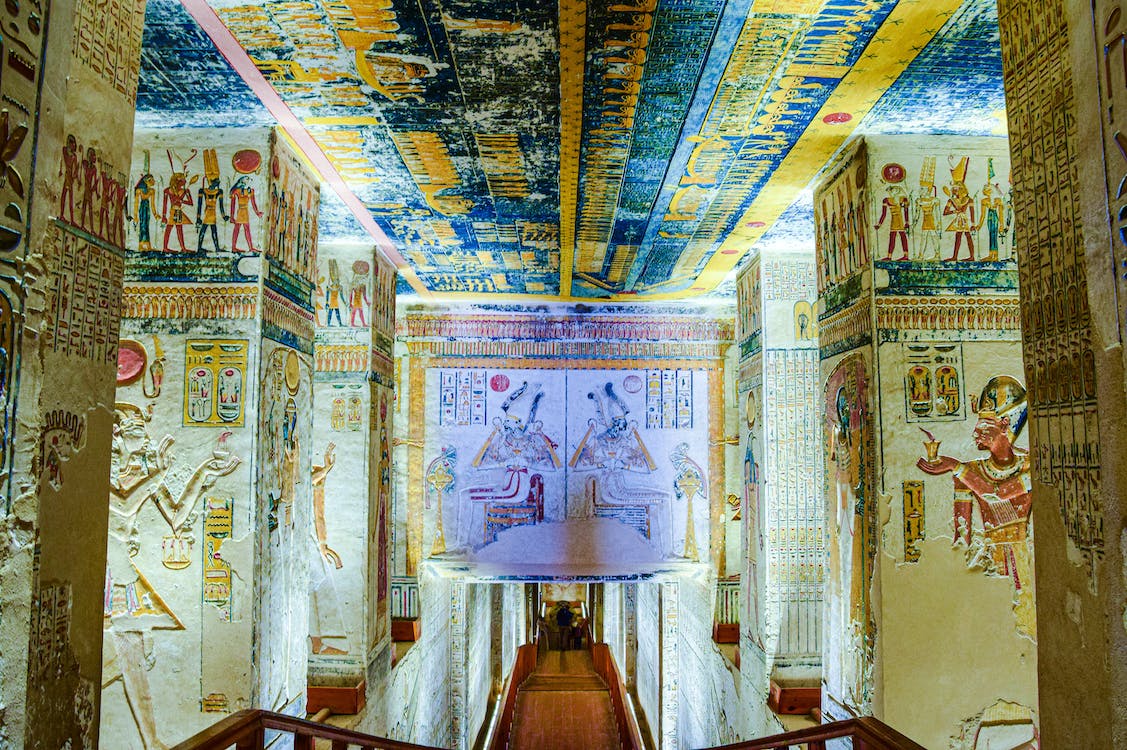Can I travel to Egypt? The land of pharaohs and pyramids beckons travelers with its rich tapestry of history, culture, and vibrant traditions. One can embark on a sensory journey amid Cairo's bustling streets and markets. From the tantalizing aromas of street food stalls to the intricate crafts of local artisans, Egypt offers a feast for the senses. In this article, we delve into four main aspects of Egyptian life, exploring how each contributes to the country's unique allure, all while addressing the burning question: Can I travel to Egypt?
Immerse Yourself in Cairo's Bustling Markets and Streets:

- Cairo's bustling markets and streets are a sensory overload, where ancient history collides with modern life. As you navigate this vibrant city, prepare to be swept away by the sights, sounds, and smells that make Cairo unique.
- Start your journey in Khan El Khalili, one of the oldest bazaars in the Middle East. Lose yourself in its maze of narrow alleyways filled with merchants selling everything from spices and textiles to souvenirs and jewelry. Bargain with vendors for that perfect treasure to take home as a memento of your time in Cairo.
- As you wander through the streets, take in the sights of historic landmarks such as the majestic Cairo Citadel and the iconic Al-Azhar Mosque. Marvel at the intricate architecture and immerse yourself in the rich history of this ancient city.
- A visit to Cairo would only be complete with sampling its delicious street food. Indulge in traditional dishes like koshari, Falafel, and taameya from vendors lining the streets. Let your taste buds guide you as you explore the diverse flavors of Egyptian cuisine.
- As the sun sets, head to the bustling neighborhood of Downtown Cairo. Join the locals as they gather in cafes and restaurants, sipping tea and smoking shisha as they discuss politics, culture, and life in the city.
- End your day with a stroll along the Nile River, where you can watch the city come alive with lights and activity. Take in the breathtaking views of Cairo's skyline as you reflect on the memories you've made in this vibrant metropolis.
- Whether you're haggling in the bazaars, sampling street food, or soaking in the city's sights and sounds, Cairo's markets and streets offer an unforgettable experience that will stay with you long after you've left.
Unveiling the Culinary Delights of Egyptian Cuisine:

Egyptian cuisine is a delightful fusion of flavors and influences from various cultures spanning centuries of history. From hearty stews to aromatic spices, here's a glimpse into the culinary wonders of Egypt:
- Koshari: Can I travel to Egypt? Considered Egypt's national dish, koshari is a comforting and hearty meal made with rice, lentils, macaroni, and chickpeas and topped with a spicy tomato sauce and crispy fried onions. It's a satisfying vegetarian option that locals and visitors enjoy.
- Taameya (Egyptian Falafel): Can I travel to Egypt? Unlike the traditional chickpea-based Falafel in other Middle Eastern cuisines, taameya is made with fava beans, parsley, coriander, and spices. It's deep-fried to perfection, resulting in a crispy exterior and a soft, flavorful interior. Enjoy it as a snack or stuffed into pita bread with fresh vegetables and tahini sauce.
- Ful Medames: Can I travel to Egypt? A popular breakfast dish, Ful Medames consists of cooked fava beans seasoned with garlic, lemon juice, and olive oil. It's often served with bread or flatbread for dipping and is a nutritious and filling way to start the day.
- Molokhia: This green, leafy vegetable is the star ingredient in a savory stew that shares its name. Molokhia leaves are finely chopped and cooked with garlic, coriander, and sometimes meat (chicken, rabbit, or lamb). The result is a thick, flavorful broth typically served over rice or with bread.
- Mahshi: Can I travel to Egypt? A staple of Egyptian cuisine, mahshi refers to vegetables such as eggplant, zucchini, peppers, and vine leaves stuffed with rice, herbs, and sometimes meat. These stuffed vegetables are then simmered in a tomato-based sauce until tender and bursting with flavor.
- Egyptian Desserts: Can I travel to Egypt Indulge your sweet tooth with traditional Egyptian desserts like baklava (layers of phyllo pastry filled with nuts and sweetened with honey or syrup), basbousa (semolina cake soaked in syrup and often topped with almonds or coconut), and kunafa (a pastry made with shredded phyllo dough, filled with cheese or nuts, and soaked in sugar syrup).
- Aish Baladi: Can I travel to Egypt? Also known as Egyptian flatbread, aish baladi is a staple accompaniment to almost every meal in Egypt. Made with whole wheat flour, water, salt, and yeast, this bread is baked at high temperatures to achieve a chewy texture and slightly charred crust.
Exploring the Art and Crafts of Egypt's Artisans:

Exploring the arts and crafts of Egypt offers a fascinating glimpse into the country's rich cultural heritage and the skill of its artisans. Here are some highlights of Egypt's traditional arts and crafts:
- Handwoven Textiles: Egyptian artisans have a long history of weaving textiles using techniques passed down through generations. From intricate carpets and rugs to vibrant tapestries and wall hangings, these textiles often feature traditional patterns and motifs inspired by Egypt's ancient heritage.
- Pottery and Ceramics: Pottery has been a part of Egyptian culture for thousands of years, with techniques dating back to the time of the pharaohs. Artisans continue to create beautiful ceramics using wheel throwing and hand molding. Look for pieces adorned with colorful glazes and decorative motifs that reflect Egypt's artistic traditions.
- Metalwork: Egyptian metalworkers are renowned for their skill in crafting intricate jewelry, sculptures, and decorative items using techniques such as filigree, engraving, and inlay. From gleaming gold and silver pieces to ornate brass and copperwork, these creations showcase the craftsmanship and artistry of Egypt's artisans.
- Woodcarving: Woodcarving is another traditional craft practiced in Egypt, with artisans producing everything from ornate furniture and architectural details to decorative objects and souvenirs. The intricate designs and meticulous craftsmanship of these wooden creations are a testament to the skill and dedication of Egypt's woodworkers.
- Glassblowing: The art of glassblowing has a long history in Egypt, dating back to ancient times. Today, artisans continue to produce exquisite glassware using traditional techniques passed down through generations. From colorful vases and bowls to delicate ornaments and jewelry, Egyptian glassblowers create beautiful and functional pieces.
- Papyrus Art: Papyrus, a plant native to the Nile Delta, has been used in Egypt for millennia to develop paper and artwork. Artisans skillfully craft papyrus sheets by hand, using traditional methods preserved for centuries. These sheets are then used to create intricate paintings and hieroglyphic-inspired designs that capture the essence of Egypt's ancient heritage.
- Embroidery and Needlework: Embroidery and needlework are integral parts of Egyptian textile traditions, with artisans creating stunning designs using techniques such as cross-stitch, appliqué, and beadwork. These intricate embellishments can be found on everything from clothing and accessories to home décor items, showcasing the creativity and artistry of Egypt's needleworkers.
Celebrating Festivals and Events that Showcase Egypt's Rich Heritage:

Egypt's rich heritage is celebrated yearly with various festivals and events that showcase its vibrant culture, history, and traditions. Here are some notable festivals and events that you won't want to miss:
- Egyptian National Day (July 23): Celebrating the 1952 Egyptian Revolution, Egyptian National Day is marked with patriotic fervor across the country. Festivities typically include parades, fireworks, cultural performances, and exhibitions highlighting Egypt's achievements and heritage.
- Cairo International Film Festival (November): Established in 1976, the Cairo International Film Festival is one of the oldest and most prestigious film festivals in the Arab world. It showcases a diverse selection of international and Arab cinema, attracting filmmakers, actors, and cinephiles from around the globe.
- Luxor African Film Festival (March): Held annually in the historic city of Luxor, this film festival celebrates African cinema and promotes cultural exchange and dialogue. It features screenings of African films, workshops, panel discussions, and networking events for filmmakers and industry professionals.
- Cairo International Book Fair (January/February): The Cairo International Book Fair is one of the largest book fairs in the Arab world, attracting publishers, authors, and book lovers from around the globe. It offers a vast selection of books in various languages and genres, along with cultural events, book signings, and literary discussions.
- Egyptian Arab Music Festival (October/November): Organized by the Egyptian Ministry of Culture, this festival celebrates Arab music and showcases the talents of renowned musicians and performers from Egypt and the Arab world. Concerts, recitals, and workshops are held in Cairo and other cities.
- Wafaa El-Nil Festival (August): Also known as the Flooding of the Nile Festival, Wafaa El-Nil is an ancient Egyptian celebration commemorating the annual flooding of the Nile River, vital for agriculture and fertility. Today, the festival includes traditional rituals, music, dance, and boat processions along the Nile.
- Sham El Nessim (Spring Festival): Celebrated on the first Monday after the Coptic Christian Easter, Sham El Nessim is an ancient Egyptian festival that marks the arrival of spring. Families gather for picnics in parks and gardens, enjoying traditional foods such as salted fish, colored eggs, and freekeh (fermented mullet).
Conclusion:
Can I travel to Egypt? As we've explored the myriad facets of Egyptian life, from the bustling markets of Cairo to the rich tapestry of culinary delights, one thing becomes abundantly clear: Egypt is a country that captivates the imagination and nourishes the soul. Despite past challenges, Egypt has emerged as a beacon of resilience and hope, welcoming travelers with open arms and inviting them to experience the magic of this ancient land. Can I travel to Egypt and immerse myself in its rich cultural tapestry? The answer is a resounding yes. With proper precautions, travelers can embark on a journey of discovery, exploring the wonders of Egypt and creating memories to last a lifetime.
Questions and Answers
Can I travel to Egypt right now?
Yes, Egypt is open to international tourists. However, it is essential to check the latest travel advisories and entry requirements before planning your trip, as these may vary depending on your country of origin and current health situation.
Are there any COVID-19 restrictions for Can I travel to Egypt?
Yes, travelers to Egypt may be required to provide proof of a negative COVID-19 test taken within a specific timeframe before departure. Additionally, some travelers may need to undergo testing upon arrival or quarantine for a specified period. Reviewing the latest guidelines from Egyptian authorities and your airline before traveling is essential.
Do I need a visa to Can I travel to Egypt?
It depends on your nationality. Many nationalities can obtain a tourist visa upon arrival at Egyptian airports or apply for an e-visa online before traveling. However, some nationalities may require a visa in advance. Check with the nearest Egyptian embassy or consulate for specific visa requirements based on your nationality.


 License No 52
License No 52



